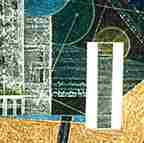|
Paolo Soleri
–
architect
|

|
"...we will eventually have to nudge reality toward meaning and the self–revelation of itself that such meaning may imply and generate."
|

|
| |
|
|
|
| |
How were you motivated to choose your particular field? |
| |
From age 5, I experienced the contrast city–country, mountains. I lived
in Torino, Italy, hiked, bicycled, climbed the Alps. That experience
turned up in my architecture and planning, with the sun presence in the
forefront. Every child should not be deprived of such eye opening, mind
filling, exhilarating occasions.
I had three academic openings at the end of the Liceo Artistico
(Academica Albertina Torino). These were in architecture, fine arts,
and industrial arts.
I chose architecture at the Polytechnic of Torino.
|
|

|
| |
|
|
|
| |
What can you share about your creative process? |
| |

|
|
The notion that regardless of our personal limitations, we are all
"creators" has generated the inflationary concept of everything goes or
"my opinion is as good as yours." It plays into the hands of mediocrity,
and we all pay for it. Now even the environment pays for it.
I am intent in finding a coherent way about sheltering. Given the nature
of life, the present demographic pressure, and the limitations of the
biosphere, I find it necessary to put my efforts in redefining habitat,
the shelter for the human species and its needs ("institutions").
|
|
| |
|
|
|
| |
What ideas do you have for a future human community on Mars?
|
| |
A redefinition of habitat:
On Mars, the notion of arcology, architecture–ecology, poses this
relationship in the form of a threat. We find in Mars more of a harsh
resource than a lovable offering (the Earth).
In fact, short of installing on Mars a climate extraneous to the planet,
we have to export to it a fragment, tiny and simplified, of our earthly
environment. I call such fragments ecominutiae.
The city in a bubble is my anticipation. A bubble to emulate a bit of
our
earth. A city because a stripped down and segregated life moving in the
infinite blackness of the cosmos desperately needs the Urban Effect.
Short of constructing cities, life out there would turn into
penitentiary
experiences, grim and technocratic.
Why go out there in the first place?
As an "ultimate" answer, because we will eventually have to nudge
reality
toward meaning and the self–revelation of itself that such meaning may
imply and generate. On that route, we could eventually hope for a
universal, that is, cosmic, intellection. A condition promising the
advent of meaning and the resolution of inequity, in fact, an
esthetogenesis of reality, the singular point of grace.
|
|

|
|




